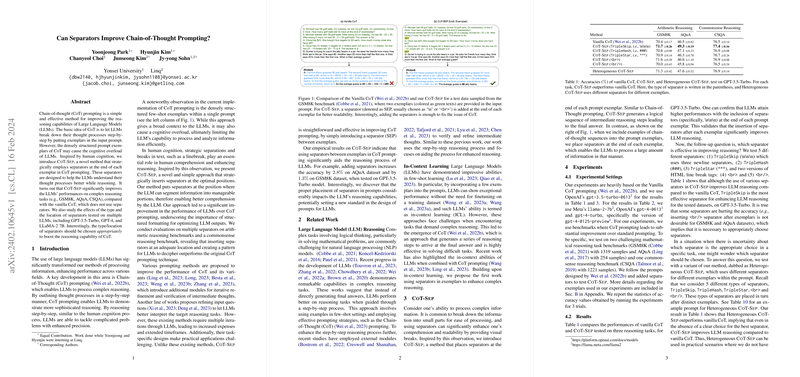Enhancing Chain-of-Thought Prompting with Strategic Use of Separators
Introduction to CoT Prompting and its Limitations
Chain-of-Thought (CoT) prompting has emerged as a compelling strategy to enhance the reasoning capabilities of LLMs. By instructing LLMs to decompose complex problems into a series of intermediate steps before arriving at the final answer, CoT prompting mirrors human cognitive processes, facilitating improved problem-solving efficiency. Despite its effectiveness, a dense structure of prompt exemplars may induce cognitive overload in LLMs, potentially restraining their reasoning capacity. Drawing inspiration from human cognition, where strategic breaks significantly bolster comprehension and reasoning, the introduction of OT-SEP aims to alleviate such limitations.
Introducing OT-SEP: A Novel Strategy
OT-SEP represents a pioneering approach that strategically implements separators within CoT prompts. These separators, added at the end of each exemplar, serve to enhance the LLM's comprehension of its thought processes. Through empirical evaluation, OT-SEP has demonstrated notable improvements in LLM performance across various complex reasoning tasks, including arithmetic and commonsense reasoning benchmarks, when juxtaposed with the conventional CoT method which does not leverage separators.
Experimental Insights and Practical Applications
Extensive experimentation underscores the significance of choosing appropriate separators to amplify CoT's reasoning capabilities. The findings reveal that certain separators, specifically triple new lines (TripleSkip), substantially outperform others in boosting LLM reasoning accuracy. Interestingly, the effectiveness of separators can be contingent on the task, emphasizing the importance of contextual applicability. Moreover, the introduction of Heterogeneous CO T-SEP, which diversifies separators within a single prompt, has shown promise in scenarios where a single optimal separator is not apparent.
Future Perspective and Conclusion
The adoption of OT-SEP illustrates a meaningful advance in optimizing prompt design for LLMs. This research not only highlights the practical utility of separators in enhancing reasoning tasks but also opens avenues for integrating OT-SEP with other prompting techniques. Although the focus has thus far been on arithmetic and commonsense reasoning, the potential applicability of OT-SEP across a wider array of tasks warrants further exploration. Given the consistent improvement in LLM performance facilitated by OT-SEP, future endeavors may delve into the granular impact of separator types and their placements, catering to an array of LLM architectures and tasks.
Limitations and Ethical Considerations
It is pertinent to acknowledge the limitations intrinsic to CoT-based approaches, primarily the reliance on LLMs' ability to generate step-by-step reasoning, which may engender undue trust in their outputs. Furthermore, the necessity for precise separator placement to avoid diminishing accuracy emphasizes the need for meticulous implementation of OT-SEP. Lastly, while no direct ethical concerns are emanated from this research, the overarching implications of LLM reliance underscore the importance of cautious and critical application in real-world contexts.
